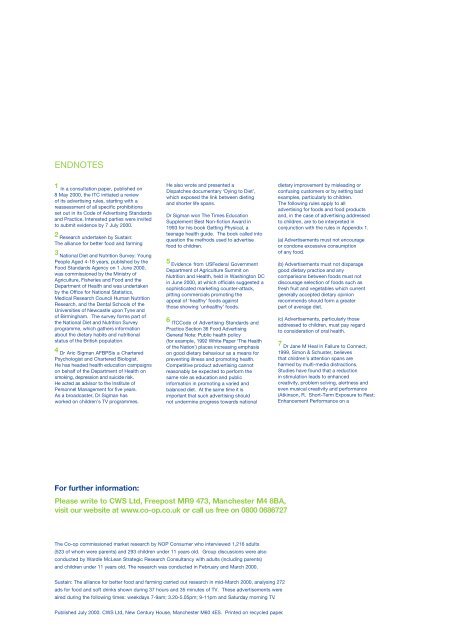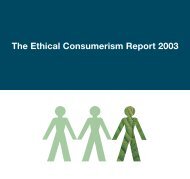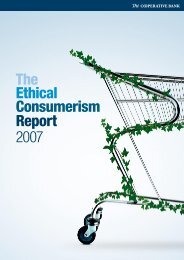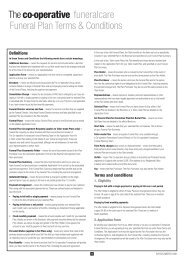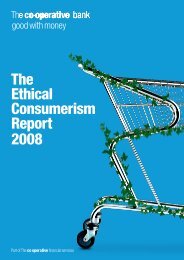Blackmail Report PDF - The Co-operative
Blackmail Report PDF - The Co-operative
Blackmail Report PDF - The Co-operative
You also want an ePaper? Increase the reach of your titles
YUMPU automatically turns print PDFs into web optimized ePapers that Google loves.
ENDNOTES<br />
1 In a consultation paper, published on<br />
8 May 2000, the ITC initiated a review<br />
of its advertising rules, starting with a<br />
reassessment of all specific prohibitions<br />
set out in its <strong>Co</strong>de of Advertising Standards<br />
and Practice. Interested parties were invited<br />
to submit evidence by 7 July 2000.<br />
2 Research undertaken by Sustain:<br />
<strong>The</strong> alliance for better food and farming<br />
3 National Diet and Nutrition Survey: Young<br />
People Aged 4-18 years, published by the<br />
Food Standards Agency on 1 June 2000,<br />
was commissioned by the Ministry of<br />
Agriculture, Fisheries and Food and the<br />
Department of Health and was undertaken<br />
by the Office for National Statistics,<br />
Medical Research <strong>Co</strong>uncil Human Nutrition<br />
Research, and the Dental Schools of the<br />
Universities of Newcastle upon Tyne and<br />
of Birmingham. <strong>The</strong> survey forms part of<br />
the National Diet and Nutrition Survey<br />
programme, which gathers information<br />
about the dietary habits and nutritional<br />
status of the British population.<br />
4 Dr Aric Sigman AFBPSis a Chartered<br />
Psychologist and Chartered Biologist.<br />
He has headed health education campaigns<br />
on behalf of the Department of Health on<br />
smoking, depression and suicide risk.<br />
He acted as advisor to the Institute of<br />
Personnel Management for five years.<br />
As a broadcaster, Dr Sigman has<br />
worked on children’s TV programmes.<br />
He also wrote and presented a<br />
Dispatches documentary ‘Dying to Diet’,<br />
which exposed the link between dieting<br />
and shorter life spans.<br />
Dr Sigman won <strong>The</strong> Times Education<br />
Supplement Best Non-fiction Award in<br />
1993 for his book Getting Physical, a<br />
teenage health guide. <strong>The</strong> book called into<br />
question the methods used to advertise<br />
food to children.<br />
5 Evidence from USFederal Government<br />
Department of Agriculture Summit on<br />
Nutrition and Health, held in Washington DC<br />
in June 2000, at which officials suggested a<br />
sophisticated marketing counter-attack,<br />
pitting commercials promoting the<br />
appeal of ‘healthy’ foods against<br />
those showing ‘unhealthy’ foods.<br />
6 ITC<strong>Co</strong>de of Advertising Standards and<br />
Practice Section 36 Food Advertising<br />
G e n e r a l Note: Public health policy<br />
(for example, 1992 White Paper ‘<strong>The</strong> Health<br />
of the Nation’) places increasing emphasis<br />
on good dietary behaviour as a means for<br />
preventing illness and promoting health.<br />
<strong>Co</strong>mpetitive product advertising cannot<br />
reasonably be expected to perform the<br />
same role as education and public<br />
information in promoting a varied and<br />
balanced diet. At the same time it is<br />
i m p o r t a n tthat such advertising should<br />
not undermine progress towards national<br />
dietary improvement by misleading or<br />
confusing customers or by setting bad<br />
examples, particularly to children.<br />
<strong>The</strong> following rules apply to all<br />
advertising for foods and food products<br />
and, in the case of advertising addressed<br />
to children, are to be interpreted in<br />
conjunction with the rules in Appendix 1.<br />
(a) Advertisements must not encourage<br />
or condone excessive consumption<br />
of any food.<br />
(b) Advertisements must not disparage<br />
good dietary practice and any<br />
comparisons between foods must not<br />
discourage selection of foods such as<br />
fresh fruit and vegetables which current<br />
generally accepted dietary opinion<br />
recommends should form a greater<br />
part of average diet.<br />
(c) Advertisements, particularly those<br />
addressed to children, must pay regard<br />
to consideration of oral health.<br />
7 Dr Jane M Heal in Failure to <strong>Co</strong>nnect,<br />
1999, Simon & Schuster, believes<br />
that children’s attention spans are<br />
harmed by multi-media distractions.<br />
Studies have found that a reduction<br />
in stimulation leads to enhanced<br />
creativity, problem solving, alertness and<br />
even musical creativity and performance<br />
(Atkinson, R. Short-Term Exposure to Rest:<br />
Enhancement Performance on a<br />
For further information:<br />
Please write to CWS Ltd, Freepost MR9 473, Manchester M4 8BA,<br />
visit our website at www.co-op.co.uk or call us free on 0800 0686727<br />
<strong>The</strong> <strong>Co</strong>-op commissioned market research by NOP <strong>Co</strong>nsumer who interviewed 1,216 adults<br />
(523 of whom were parents) and 293 children under 11 years old. Group discussions were also<br />
conducted by Wardle McLean Strategic Research <strong>Co</strong>nsultancy with adults (including parents)<br />
and children under 11 years old. <strong>The</strong> research was conducted in February and March 2000.<br />
Sustain: <strong>The</strong> alliance for better food and farming carried out research in mid-March 2000, analysing 272<br />
ads for food and soft drinks shown during 37 hours and 35 minutes of TV. <strong>The</strong>se advertisements were<br />
aired during the following times: weekdays 7-9am; 3.20-5.05pm; 9-11pm and Saturday morning TV.<br />
Published July 2000. CWS Ltd, New Century House, Manchester M60 4ES. Printed on recycled paper.


